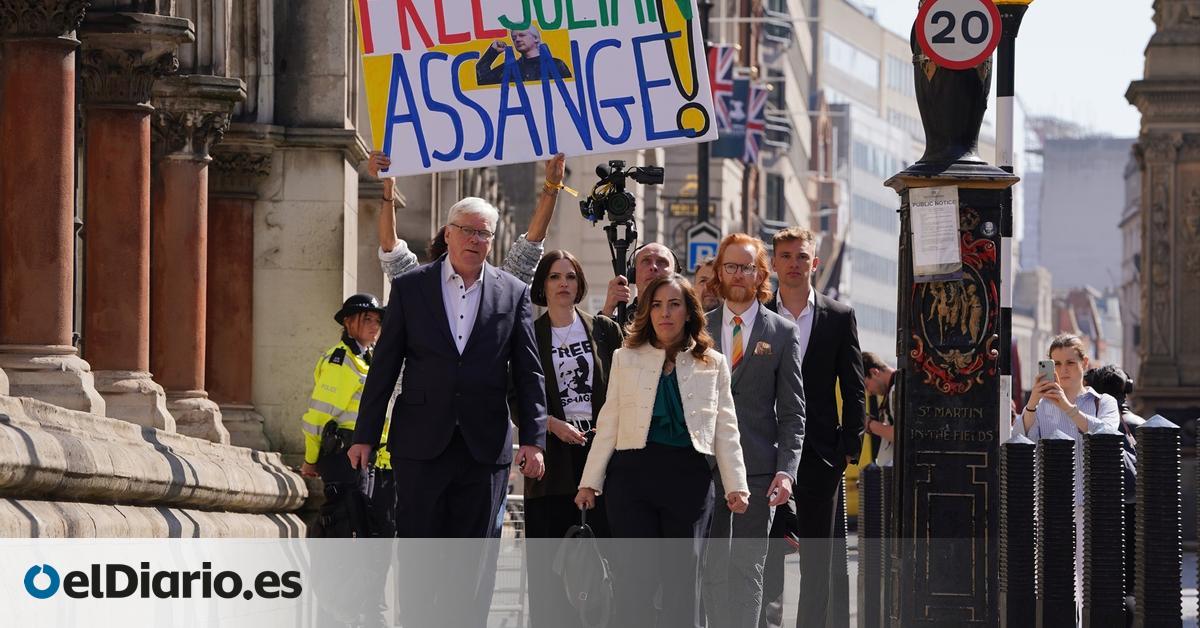
Julian Assange will be able to continue appealing to the United Kingdom Justice against his extradition to the United States, as ruled by the High Court in London this Monday. The court accepted defense arguments that the Wikileaks founder may be discriminated against as an Australian and not receive the full protection that the First Amendment of the United States Constitution offers to its citizens.
Now Assange’s defense has until May 24 to present the appeal in what could be the beginning of another long process, unless the United States agrees to drop the case and accept the time spent in jail outside London. by the founder of Wikileaks as enough. Assange’s legal team and the United States Department of Justice have been negotiating for months to withdraw the charges, according to the Wall Street Journal in March and confirmed in April by President Joe Biden. The case against Assange for the theft and publication of classified documents was started by the Department of Justice in 2019, when Donald Trump was president.
In the United States, Assange faces 17 charges of espionage and one of computer hacking for access to confidential information and its publication 15 years ago. Prosecutors accuse him of “conspiring” with Chelsea Manning, an army analyst who was sentenced to 35 years in prison in 2013 and pardoned by President Barack Obama in 2017. Wikileaks published hundreds of thousands of US government documents, including some on military operations around the world. The Justice Department’s indictment launched in 2019, when Donald Trump was president, complains, in particular, about the information that Assange published on his own, without the collaboration of the media, because he did not make an effort to protect activists from human rights, journalists and other sources cited by US diplomats and military personnel in places where these people could be tortured or killed such as China, Iran, Iraq, Syria and Afghanistan. For example, Wikileaks did not delete the names and other details of vulnerable people, as media outlets that publish confidential information typically do.
Most of the material in question dates back to events that occurred almost two decades ago, and some of the information had already been published or was later published in more detail by media in the United States.
The Justice Department disputes that Assange can be considered a journalist for failing to meet minimum publication standards, but the Committee to Protect Journalists and PEN, the writers’ organization, among other free speech activist groups, They insist that a possible conviction of Assange would set a precedent for press freedom in the United States (in fact, the Obama Administration decided not to open a case against the founder of Wikileaks for this reason).
Assange did not attend the hearing in London for health reasons, according to his wife, Stella Assange, whom he married in prison and has two children. Rebecca Vincent, campaign director of Reporters Without Borders and who was present at the hearing, assured this Monday that the last two times she visited Assange in prison she left concerned about “his state of mental and physical health.” . Vincent later said she was “relieved” by the British court’s decision.
What is it about
Wikileaks’ most substantial revelations came from collaboration with the New York Times and other media, for example, the Pentagon’s internal reports on civilian and military casualties in the Iraq War between 2004 and 2009. Although there were already official estimates of civilian deaths and injuries, the reports made it possible to compare sources and offer a more faithful picture of reality, which included 15,000 more deaths compared to the first official figures.
Furthermore, in 2010, Wikileaks published a video from 2007 showing how a United States helicopter shot and killed 11 civilians, including two journalists from the Reuters agency. The news agency saw it shortly after the events occurred although it did not have authorization to reproduce it; His Baghdad office chief had already accused the US military of “lying” about what had happened that day.
Wikileaks also published in 2011 partly on its own and partly on the New York Times more details about the abuse of prisoners in Guantánamo, also revealed with other sources by the CBS network, the AP news agency and the New Yorker in 2004.

Extradition yes or no
After years of legal battle, the British Government authorized Assange’s extradition to the United States in 2022, but the Wikileaks founder’s legal team stopped it with appeals to British justice, which offers a system with multiple avenues of appeal in the country. in addition to submitting to the intervention of the European Court of Human Rights, which can stop any extradition at the last minute. This court has so far refused to take up the case.
In March, the British justice system froze the decision on Assange’s extradition and agreed with him regarding the lack of sufficient guarantees from Washington that he will not be discriminated against for being an Australian citizen and will be able to make full use of the First Amendment of the United States Constitution. United States, which protects freedom of expression more broadly than in the United Kingdom or in most European countries, including Spain.
The United States responds that Assange will not have his defense capabilities limited because he is Australian and will be able to resort to the First Amendment, although its application in this case is “the jurisdiction of the United States courts” and not what the Department of Justice says. . Furthermore, representatives of the Biden Administration commit in writing that “a death sentence will neither be requested nor imposed on Assange.” Assange’s legal team has repeated that the Wikileaks founder could be sentenced to 175 years in prison or the death penalty. US authorities say that if he is found guilty in a court in the United States, the penalty could be a few years in prison. The British court accepted this Monday Washington’s guarantees that Assange would in no case be at risk of being sentenced to the death penalty, but rejected those related to the First Amendment.
The Committee to Protect Journalists (CPJ) assures that the guarantees about the possibility of Assange being protected by the First Amendment are not sufficient. “This ignores the fact that the charges themselves directly challenge First Amendment rights,” he says in a joint statement with other civil rights organizations. “This would create an alarming legal precedent for the extradition of journalists to the United States for the publication of classified material of public interest.”
Assange has been in a British prison since 2019 and previously spent seven years sheltering in the Ecuadorian embassy in London to avoid being extradited to Sweden, which was investigating two accusations of rape in that country (the Swedish prosecutor’s office abandoned the case in 2019 because it considered that there were spent too much time collecting testimonies).
Source: www.eldiario.es

